Submitted:
11 May 2023
Posted:
12 May 2023
You are already at the latest version
Abstract
Keywords:
1. Introduction
2. Materials and Methods
2.1. Geographic Location
2.2. Sampling and Data Collection
2.3. Statistical Analysis Systems
3. Results
3.1. Characterization of Dairy Farmers’ Livelihoods Using Capital Theory
3.1.1. Human and Social Capital.
3.1.2. Natural Capital
3.1.3. Physical Capital
3.1.4. Financial Capital
3.2. Access to Climate Information
3.3. Perceptions of Climate Change
3.4. Relationship between Dairy Farmers’ Livelihoods and Perceptions of Climate Change
4.1. Characterization of Dairy Farmers’ Livelihoods Using Capital Theory
4.2. Relationship between Livelihoods and Perceptions of Climate Change
4.3. Agri-Environmental and Educational Policy Implications for Dairy Farmers in a Changing Climate
5. Conclusions
Author Contributions
Funding
Institutional Review Board Statement
Informed Consent Statement
Data Availability Statement
Acknowledgments
Conflicts of Interest
References
- Thornton, P. K., van de Steeg, J., Notenbaert, A., & Herrero, M. The impacts of climate change on livestock and livestock systems in developing countries: A review of what we know and what we need to know. Agricultural systems, 2009. 101(3), 113-127.
- Escarcha, J. F., Lassa, J. A., & Zander, K. K. Livestock under climate change: a systematic review of impacts and adaptation. Climate, 2018 6(3), 54.
- Herrero, M., Wirsenius, S., Henderson, B., Rigolot, C., Thornton, P., Havlík, P., De Boer, I., and Gerber, P. J. Livestock and the environment: what have we learned in the past decade?. Annual Review of Environment and Resources, 2015. 40.
- Weindl, I., Lotze-Campen, H., Popp, A., Müller, C., Havlík, P., Herrero, M., Schmitz, C., and & Rolinski, S. Livestock in a changing climate: production system transitions as an adaptation strategy for agriculture. Environmental Research Letters, 2015. 10(9), 094021.
- Toulkeridis, T., Tamayo, E., Simón, D., Merizalde, M.J., Reyes, D.F., Viera, M. and Heredia, M. Cambio Climático según los académicos ecuatorianos - Percepciones versus hechos. La Granja: Revista de Ciencias de la Vida. 2020. 31(1):21-46. http://doi.org/10.17163/lgr.n31.2020.02.
- Chambers, R., & Conway, G. Sustainable rural livelihoods: practical concepts for the 21st century. Institute of Development Studies (UK) 1992.
- DfiD. Sustainable Livelihoods Guidance Sheets: Framework Introduction Vulnerability Transforming. London, UK. 1999. [CrossRef]
- Harvey, C. A., Martínez-Rodríguez, M. R., Cárdenas, J. M., Avelino, J., Rapidel, B., Vignola, R. Donatti, C., and Vilchez-Mendoza, S. The use of Ecosystem-based Adaptation practices by smallholder farmers in Central America. Agriculture, Ecosystems & Environment, 2017. 246, 279-290.
- Pica-Ciamarra, U., Tasciotti, L., Otte, J., & Zezza, A. Livestock assets, livestock income and rural households: Cross-country evidence from household surveys 2011. https://openknowledge.worldbank.org/handle/10986/17890.
- Thomson, G. R., Penrith, M. L., Atkinson, M. W., Atkinson, S. J., Cassidy, D., & Osofsky, S. A. Balancing livestock production and wildlife conservation in and around southern Africa’s transfrontier conservation areas. Transboundary and emerging diseases, 2013. 60(6), 492-506.
- Abay, K. A., & Jensen, N. D. Access to markets, weather risk, and livestock production decisions: Evidence from Ethiopia. Agricultural Economics, 2020. 51(4), 577-593.
- A Magrin, G. O., Marengo, J. A., Boulanger, J.-P., Buckeridge, M. S., Castellanos, E., Poveda, G., Vicu ̃na, S. Central and South America. In V. R. Barros, C. B. Field, D. J. Dokken, M. D. Mastrandrea, K. J. Mach, T. E. Bilir, L. L. White (Eds.), Climate Change 2014: Impacts, Adaptation, and Vulnerability. Part B: Regional Aspects. Contribution of Working Group II to the Fifth Assessment Report of the Intergovernmental Panel on Climate Change 2014. (pp. 1499–1566). Cambridge, UK: Cambridge University Press.
- Marengo, J. A., Chou, S., Torres, R. R., Giarolla, A., Alves, L. M., & Lyra, A. Climate change in central and South America: recent trends, future projections, and impacts on regional agriculture. CCAFS Working Paper 2014.
- Hannah, L., Ikegami, M., Hole, D. G., Seo, C., Butchart, S. H., Peterson, A. T., and Roehrdanz, P. R. Global climate change adaptation priorities for biodiversity and food security. PLoS One, 2013. 8(8), e72590.
- Vuille, M., Francou, B., Wagnon, P., Juen, I., Kaser, G., Mark, B. G., and Bradley, R. S. Climate change and tropical Andean glaciers: Past, present and future. Earth-science reviews, 2008. 89(3-4), 79-96.
- Chevallier, P., Pouyaud, B., Suarez, W., & Condom, T. Climate change threats to environment in the tropical Andes: glaciers and water resources. Regional Environmental Change, 2011. 11(1), 179-187.
- IPCC. Summary for Policymakers. In: Climate Change 2021: The Physical Science Basis. Contribution of Working Group I to the Sixth Assessment Report of the Intergovernmental Panel on Climate Change [Masson-Delmotte, V., P. Zhai, A. Pirani, S.L. Connors, C. Péan, S. Berger, N. Caud, Y. Chen, L. Goldfarb, M.I. Gomis, M. Huang, K. Leitzell, E. Lonnoy, J.B.R. Matthews, T.K. Maycock, T. Waterfield, O. Yelekçi, R. Yu, and B. Zhou (eds.)]. Cambridge University Press, Cambridge, United Kingdom and New York, NY, USA, 2021. pp. 3−32. [CrossRef]
- Seager, R., Lis, N., Feldman, J., Ting, M., Williams, A. P., Nakamura, J., Lui, H., and Henderson, N. Whither the 100th meridian? The once and future physical and human geography of America’s arid–humid divide. Part I: The story so far. Earth Interactions, 2018. 22(5), 1-22.
- Chakraborty, S., & Newton, A. C. Climate change, plant diseases and food security: an overview. Plant pathology, 2011. 60(1), 2-14.
- Elad, Y., & Pertot, I. Climate change impacts on plant pathogens and plant diseases. Journal of Crop Improvement, 2014. 28(1), 99-139.
- United Nations United Nations Framework Convention on Climate Change. New York: United Nations, General Assembly. 1992.
- Læssøe, J., & Mochizuki, Y. Recent trends in national policy on education for sustainable development and climate change education. Journal of Education for Sustainable Development, 2015. 9(1), 27-43.
- UNESCO. United Nations Educational, Scientific and Cultural Organization (UNESCO). UNESCO strategy for the second half of the United Nations Decade of Education for Sustainable Development. Paris. 2010.
- Mochizuki, Y., & Bryan, A. Climate change education in the context of education for sustainable development: Rationale and principles. Journal of Education for Sustainable Development, 2015. 9(1), 4–26.
- GADPC. Creación del Área de Conservación y Uso Sustentable de la Cordillera Oriental del Carchi. Gobierno Autónomo Descentralizado de la Provincia del Carchi/CONDESAN Proyecto EcoAndes. Tulcán. Ecuador 2016. (Accessed Apr 24 2022).
- MAE. Sistema de Clasificación de los Ecosistemas del Ecuador Continental. Subsecretaría de Patrimonio Natural. Ministeriodel Ambiente del Ecuador. Quito, Ecuador 2013. (accessed Apr 24 2022).
- Cayambe, J.; Iglesias, A. The cost of mitigating greenhouse gas emissions in farms in Central Andes of Ecuador. Span. J. Agric.Res. 2020, 18, 1–17.
- Cavendish, W. How Do Forests Support, Insure and Improve the Livelihoods of the Rural Poor? A Research Note; Center for Interna-tional Forestry Research: Bogor, Indonesia, 2003.
- Ellis, F. The Determinant of Rural Livelihood Diversification in Developing Countries. Journal of Agricultural Economics, 2000. 51, 289-302.
- Scoones, I. Sustainable Rural Livelihoods a Framework for Analysis. Analysis. 1998 72: 1-22.
- Torres, B.; Cayambe, J.; Paz, S.; Ayerve, K.; Heredia-R, M.; Torres, E.; Luna, M.; Toulkeridis, T.; García, A. Livelihood Capitals, Income Inequality, and the Perception of Climate Change: A Case Study of Small-Scale Cattle Farmers in the Ecuadorian Andes. Sustainability 2022, 14, 5028. [CrossRef]
- Vanclay, F., Baines, J. T., & Taylor, C. N. Principles for ethical research involving humans: ethical professional practice in impact assessment Part I. Impact assessment and project appraisal, 2013. 31(4), 243-253.
- Zuur, A.F.; Ieno, E.N.; Walker, N.J.; Saveliev, A.A.; y Smith, G.M. Zero-truncated and zero-inflated models for count data. Mixed effects models and extensions in ecology with R. Ed. Springer New York, 2009. pp 261-293.
- Greenacre, M. J. Correspondence analysis in practice. 2nd edition. Chapman & Hall/C RC Press, Boca Raton, Florida. 2010. xiii + 280 pp. (464).
- Di Rienzo J.A., Casanoves F., Balzarini M.G., Gonzalez L., Tablada M., Robledo C.W. InfoStat versión 2015. Grupo InfoStat, FCA, Universidad Nacional de Córdoba, Argentina. URL http://www.infostat.com.ar.
- R Development Core Team. R: A Language and Environment for Statistical Computing. R Foundation for Statistical Computing, Vienna, Austria 2019.
- Torres, B.; Cayambe, J.; Paz, S.; Ayerve, K.; Heredia-R, M.; Torres, E.; Luna, M.; Toulkeridis, T.; García, A. Livelihood Capitals, Income Inequality, and the Perception of Climate Change: A Case Study of Small-Scale Cattle Farmers in the Ecuadorian Andes. Sustainability 2022, 14, 5028. [CrossRef]
- Torres, B.; Andrade, V.; Heredia-R, M.; Toulkeridis, T.; Estupiñán, K.; Luna, M.; Bravo, C.; García, A. Productive Livestock Characterization and Recommendations for Good Practices Focused on the Achievement of the SDGs in the Ecuadorian Amazon. Sustainability 2022, 14, 10738. [CrossRef]
- Radolf, M., Wurzinger, M., & Gutiérrez, G. Livelihood and production strategies of livestock keepers and their perceptions on climate change in the Central Peruvian Andes. Small Ruminant Research, 2022. 215, 106763.
- Babu S, Gajanan SN, Sanyal P. Food security, poverty and nutrition policy analysis: statistical methods and applications. New York, NY: Academic Press 2014.
- Schultz, T. P. Why governments should invest more to educate girls. World development, 2002. 30(2), 207-225.
- Holmann, F. J., Rivas Ríos, L., Carulla, J., Giraldo, L. A., Guzman, S., Martinez, M., Rivera, B.; Medina, A. and Farrow, A. Evolution of milk production systems in the tropics of Latin America and its interrelationship with markets: An analysis of the Colombian case. Paper presented at the ninth world congress on animal production. Porto Alegre, Brazil, 2002. 26-31 October 2003. Nairobi (Kenya): ILRI.
- Heredia-R, M., Torres, B., Vasseur, L., Puhl, L., Barreto, D., & H Díaz-Ambrona, C. G. Sustainability dimensions assessment in four traditional agricultural systems in the Amazon. Frontiers in Sustainable Food Systems, 2022. 5, 545.
- Vasseur, L.; Thornbush, M.J.; Plante, S. Engaging Communities in Adaptation to Climate Change by Understanding the Dimensions of Social Capital in Atlantic Canada. Sustainability 2022. 14, 5250. [CrossRef]
- Jones, N.; Clark, J.R.A. Social capital and the public acceptability of climate change adaptation policies: A case study in Romney Marsh, UK. Clim. Chang. 2014. 123, 133–145.
- León-Alvear, V., Torres, B., Luna, M., Torres, A., Ramírez, P., Andrade-Yucailla, V., Muñoz-Rengifo, J. C. y Heredia-R, M. Percepción sobre cambio climático en cuatro comunidades orientadas a la ganadería bovina en la zona central de los Andes Ecuatorianos. Livestock Research for Rural Development. 2020. 32, 165. http://www.lrrd.org/lrrd32/10/mageh32165.html.
- Zambrano, E., Torres, B., Ochoa-Moreno, S., Reyes, H., Torres, A., Velasco, C., Heredia-R, M. Determinantes socioeconómicas del uso forestal maderable en la zona de amortiguamiento del Parque Nacional Sumaco Napo Galeras, Amazonía Ecuatoriana. Ecosistemas 2021. 30(3): 2216. [CrossRef]
- Galloway, C., Conradie, B., Prozesky, H., & Esler, K. Opportunities to improve sustainability on commercial pasture-based dairy farms by assessing environmental impact. Agricultural Systems, 2018. 166, 1-9.
- Kassie, M., Stage, J., Teklewold, H and Olaf, E. Gendered food security in rural Malawi: why is women’s food security status lower?. Food 2015. Sec. 7, 1299–1320 . [CrossRef]
- Bernet, T., Hervé, D., Lehmann, B., & Walker, T. Improving land use by slope farmers in the Andes: an economic assessment of small-scale sprinkler irrigation for milk production. Mountain Research and Development, 2002. 22(4), 375-382.
- Behrman, J. R., Sengupta, P., & Todd, P. Progressing through PROGRESA: An impact assessment of a school subsidy experiment in rural Mexico. Economic development and cultural change, 2005. 54(1), 237-275.
- Maluccio, J., & Flores, R. Impact evaluation of a conditional cash transfer program: The Nicaraguan Red de Protección Social. Intl Food Policy Res Inst. 2005.
- Duryea, S., & Morrison, A. The effect of conditional transfers on school performance and child labor: Evidence from an ex-post impact evaluation in Costa Rica 2004.
- Vos, R., León, M., & Brborich, W. Are cash transfer programs effective to reduce poverty? Mimeo. 2001.
- León, M., & Younger, S. D. Transfer payments, mothers’ income and child health in Ecuador. The Journal of Development Studies, 2007. 43(6), 1126-1143.
- Martínez, D., Borja, T., Medellín, N., & Cueva, P.¿Cómo funciona el Bono de Desarrollo Humano?: mejores prácticas en la implementación de Programas de Transferencias Monetarias Condicionadas en América Latina y el Caribe. BID. 2017.
- Ponce, J., & Bedi, A. S. The impact of a cash transfer program on cognitive achievement: The Bono de Desarrollo Humano of Ecuador. Economics of Education Review, 2010. 29(1), 116-125.
- Schady, N. R., & Araujo, M. Cash transfers, conditions, school enrollment, and child work: Evidence from a randomized experiment in Ecuador 2006. (Vol. 3). World Bank Publications.
- Ghahramani, A., & Bowran, D. Transformative and systemic climate change adaptations in mixed crop-livestock farming systems. Agricultural systems, 2018. 164, 236-251.
- Amamou, H., Sassi, M. B., Aouadi, H., Khemiri, H., Mahouachi, M., Beckers, Y., & Hammami, H. Climate change-related risks and adaptation strategies as perceived in dairy cattle farming systems in Tunisia. Climate Risk Management, 2018. 20, 38-49.
- Karimi, V., Karami, E., & Keshavarz, M. Vulnerability and adaptation of livestock producers to climate variability and change. Rangeland Ecology & Management, 2018. 71(2), 175-184.
- Biglari, T., Maleksaeidi, H., Eskandari, F., & Jalali, M. Livestock insurance as a mechanism for household resilience of livestock herders to climate change: Evidence from Iran. Land Use Policy, 2019. 87, 104043.
- Torres, B.; Cayambe, J.; Paz, S.; Ayerve, K.; Heredia-R, M.; Torres, E.; Luna, M.; Toulkeridis, T.; García, A. Livelihood Capitals, Income Inequality, and the Perception of Climate Change: A Case Study of Small-Scale Cattle Farmers in the Ecuadorian Andes. Sustainability 2022, 14, 5028. [CrossRef]
- Browning-Aiken, A., Morehouse, B., Davis, A., Wilder, M., Varady, R., Goodrich, D., Carter, R., Moreno, D. and McGovern, E. D. Climate, water management, and policy in the San Pedro Basin: results of a survey of Mexican stakeholders near the US–Mexico border. Climatic Change, 2007. 85(3), 323-341.
- Kim, S. Y., & Wolinsky-Nahmias, Y. Cross-national public opinion on climate change: The effects of affluence and vulnerability. Global Environmental Politics, 2014. 14(1), 79-106.
- Smith, N., & Leiserowitz, A. The rise of global warming skepticism: Exploring affective image associations in the United States over time. Risk Analysis: An International Journal, 2012. 32(6), 1021-1032.
- Whitmarsh, L. Scepticism and uncertainty about climate change: Dimensions, determinants and change over time. Global environmental change, 2011. 21(2), 690-700.
- Roco, L., Engler, A., Bravo-Ureta, B.E. Jara-Rojas, R. Farmers’ perception of climate change in mediterranean Chile. Reg Environ Change 15, 867–879 2015. [CrossRef]
- Hammami, H., Bormann, J., M’hamdi, N., Montaldo, H. H., & Gengler, N. Evaluation of heat stress effects on production traits and somatic cell score of Holsteins in a temperate environment. Journal of dairy science, 2013. 96(3), 1844-1855.
- Sanker, C., Lambertz, C., & Gauly, M. Climatic effects in Central Europe on the frequency of medical treatments of dairy cows. Animal, 2013. 7(2), 316-321.
- Sejian, V., Kumar, D., Gaughan, J. B., & Naqvi, S. M. Effect of multiple environmental stressors on the adaptive capability of Malpura rams based on physiological responses in a semi-arid tropical environment. Journal of Veterinary Behavior, 2017. 17, 6-13.
- Samaniego, J., Alatorre, J., Ferrer, J., Muñoz, L., Arpaia L, Panorama de las contribuciones determinadas a nivel nacional en América Latina y el Caribe, 2019: avances para el cumplimiento del Acuerdo de París (LC/TS.2019/89-P), Santiago, Comisión Económica para América Latina y el Caribe (CEPAL), 2019.
- González-Gaudiano, E. J., & Meira, P. Á. Educación para el cambio climático: ¿Educar sobre el clima o para el cambio? Perfiles educativos, 2020. 42(168), 157-174.
- Læssøe, J., & Mochizuki, Y. Recent Trends in National Policy on Education for Sustainable Development and Climate Change Education. Journal of Education for Sustainable Development, 2015. 9(1), 27–43. [CrossRef]
- UNESCO. Climate change education for sustainable development. UNESCO Climate Change Initiative. 2010. Retrieved from: http://unesdoc.unesco.org/images/0019/001901/190101E.pdf.
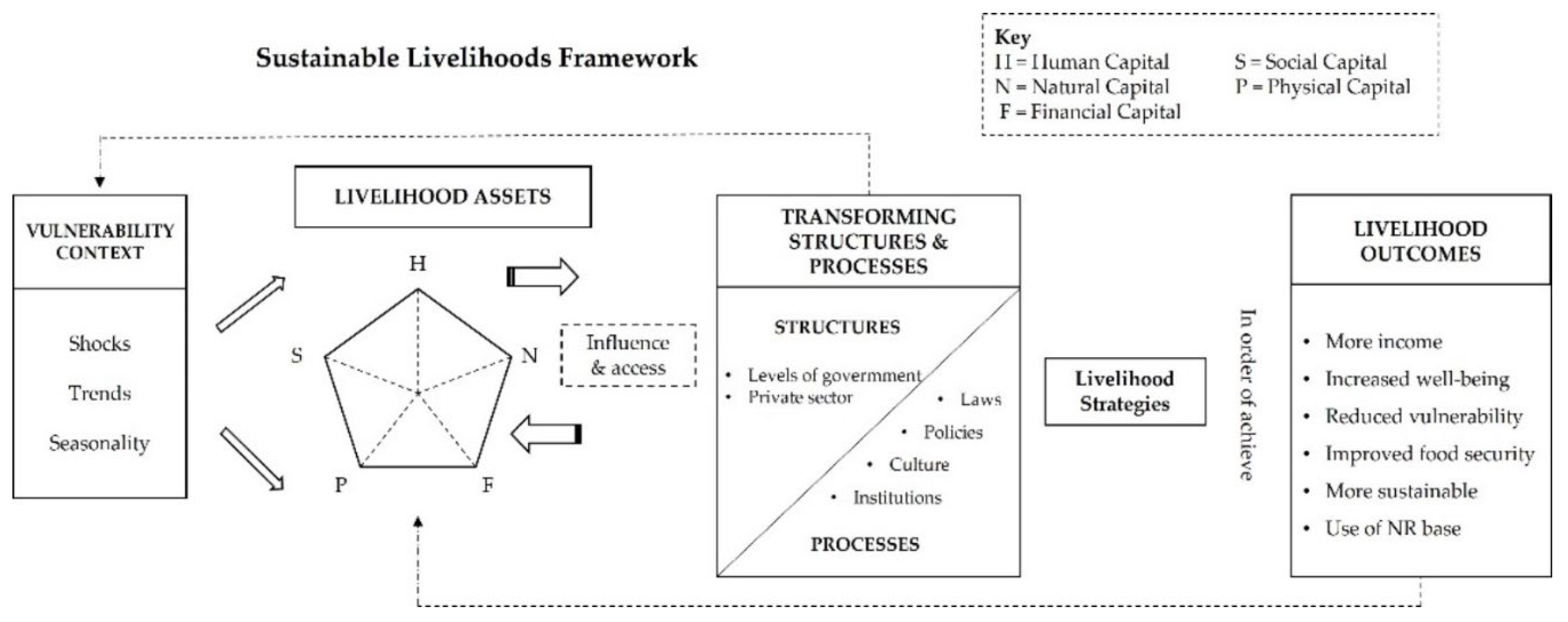
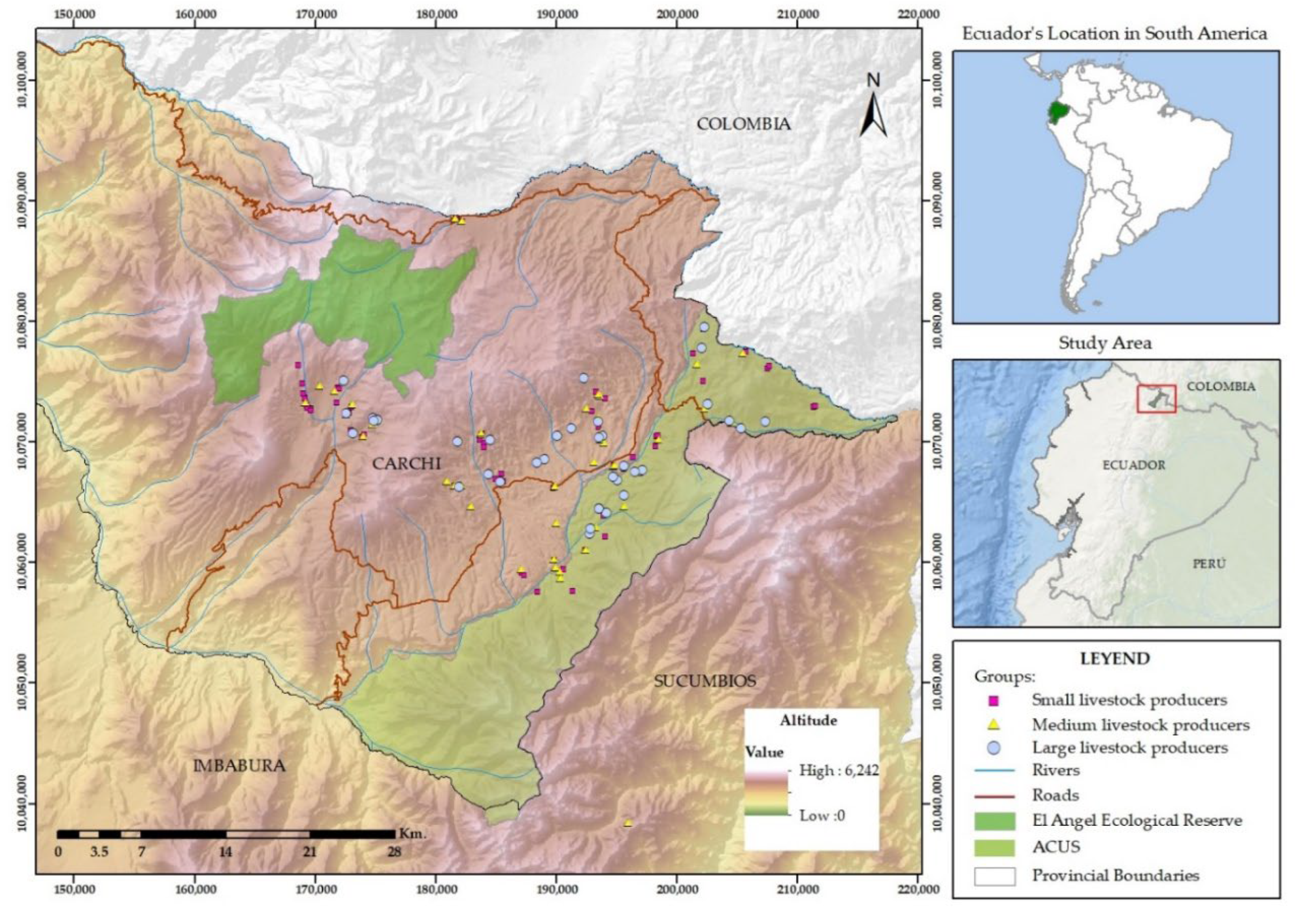
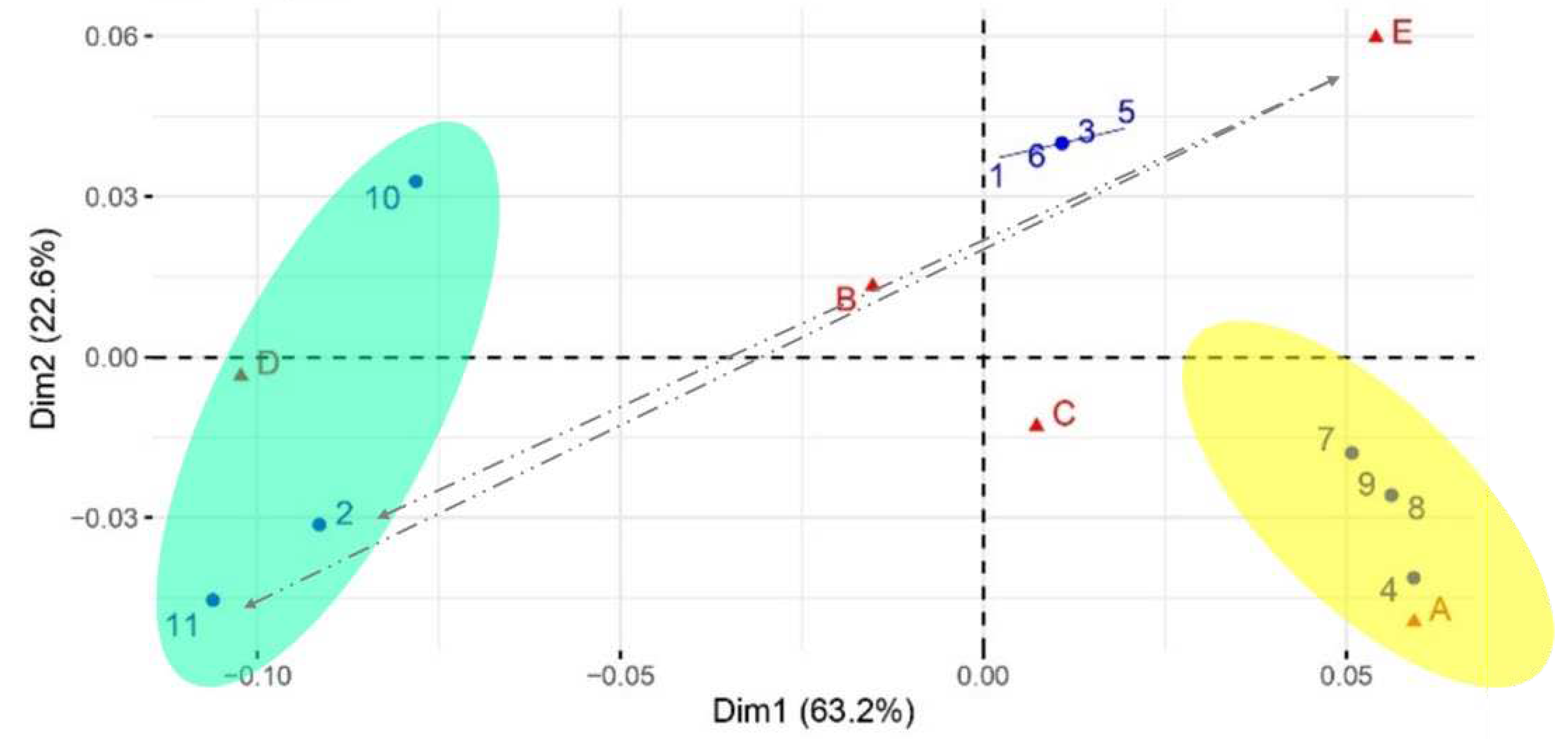
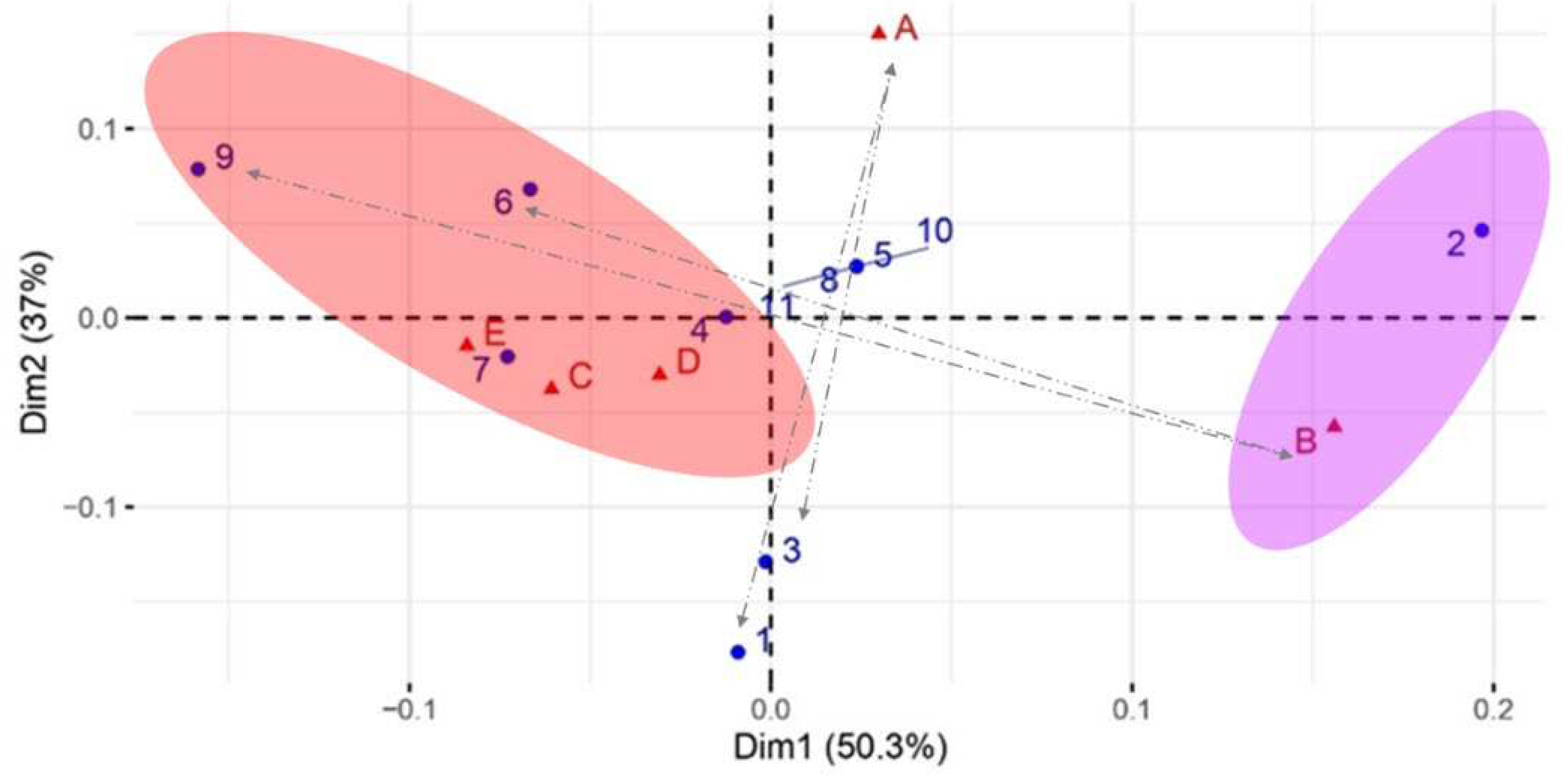
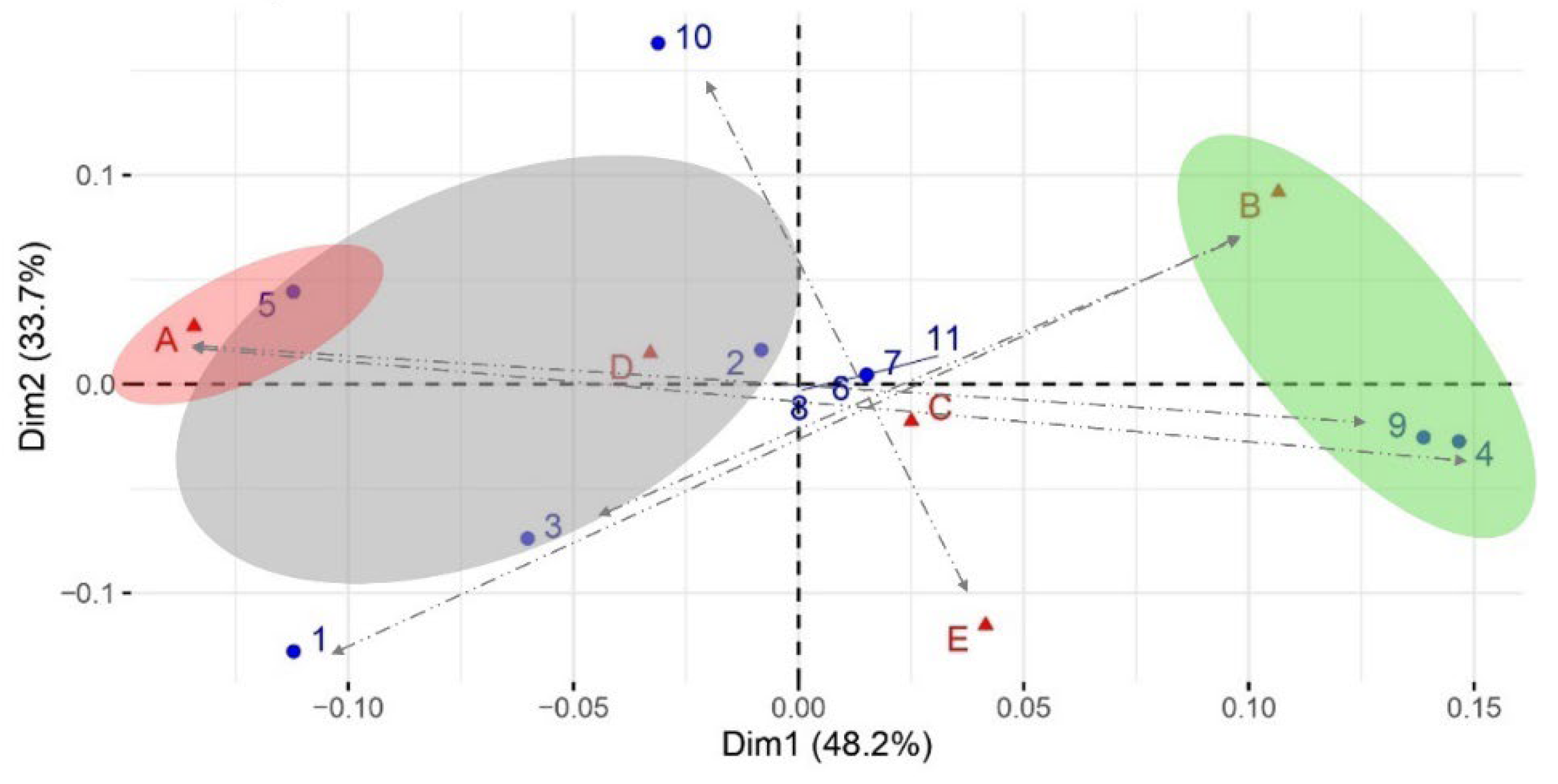
| Theme | Variables |
|---|---|
| Human and Social | Age, gender, and educational level of the head of the household; Experience in milk production, work outside the farm, and whether the farmer receives advice from community leaders. |
| Natural Financial and Physical |
Total farm area, pasture area, cultivated land area. Owns motorized strimmer, portable milking equipment, owns manual fumigation pumps, number of cows in production, number of bulls, total herd, number of months cows are in production, total milk production in liters per day, milk price– average in dollars per liter, receipt of government welfare money, and receipt of livestock/agricultural insurance. |
| Variable | Dairy Cattle Farmers | |||||
|---|---|---|---|---|---|---|
| Small | Medium | Large | Average | p-value | ||
| Age (years) | 46.73 (12.61) |
49.16 (12.23) |
48.76 (15.22) |
48.22 | 0.6998 1 | |
| Gender (%) | Men | 72a | 80ab | 89b | 80.33 | 0.0847 2 |
| Women | 28a | 20ab | 11b | 19.67 | ||
| Educational level (%) | None | 6.41 | 5.45 | 2.70 | 4.86 | 0.0016 3 |
| Literate | 1.28 | 0.00 | 0.00 | 0.43 | ||
| Primary | 76.92 | 72.73 | 64.86 | 71.51 | ||
| Secondary | 14.10 | 12.73 | 29.73 | 18.85 | ||
| Technological training | 1.28 | 0.00 | 0.00 | 1.28 | ||
| University | --- | 9.09 | 2.70 | 5.90 | ||
| Experience in dairy production (years) | 20.29 (11.58) |
23.38 (13.38) |
20.30 (12.90) |
21.32 | 0.4657 1 | |
| Where they work (%) | On the farm | 52.56a | 74.55b | 89.19c | 72.10 | 0.0001 2 |
| Outside the farm | 47.44a | 25.45b | 10.81c | 27.90 | ||
| Receives advice from community leaders (%) | Yes | 5.13 | 3.64 | 2.70 | 3.82 | 0.8050 2 |
| No | 94.87 | 96.36 | 97.30 | 96.18 | ||
| Variable | Dairy Cattle Farmers | ||||
|---|---|---|---|---|---|
| Small | Medium | Large | Average | p-value | |
| Area of the farm (ha) | 3.36a (1.32) | 7.67b (1.38) | 18.95c (6.27) | 9.99 | <0.0001 |
| Area of pastureland (ha) | 2.17a (1.10) | 5.17b (1.45) | 14.00c (6.82) | 7.11 | <0.0001 |
| Area of cultivated land (ha) | 1.19a (0.82) | 2.50b (1.41) | 4.95c (3.23) | 2.88 | <0.0001 |
| Variables | Dairy Cattle Farmers | |||||
|---|---|---|---|---|---|---|
| Small | Medium | Large | Average | p-value | ||
| Owns a motorized strimmer (%) | Yes | 3.85 | - | 5.41 | 4.63 | 0.1273 2 |
| No | 96.15 | 100 | 94.59 | 96.91 | ||
| Owns portable milking equipment (%) | Yes | 5.13 | 9.09 | 10.81 | 8.34 | 0.4944 2 |
| No | 94.87 | 90.91 | 89.19 | 91.66 | ||
| Owns manual fumigation pumps (%) | Yes | 76.92 | 72.73 | 70.27 | 73.31 | 0.7190 2 |
| No | 23.08 | 27.27 | 29.73 | 26.69 | ||
| Number of cows in production | 4.06a (2.54) |
7.84b (4.37) |
18.24c (15.65) |
10.05 | <0.0001 1 | |
| Number of bulls | 0.46a (0.68) |
0.60a (1.05) |
1.11b (0.99) |
0.72 | 0.0005 1 | |
| Total herd | 4.53a (2.74) |
8.44b (4.47) |
19.35c (15.70) |
10.77 | <0.0001 1 | |
| Number of months that the cows are in production |
7.11 (0.77) |
7.22 (1.33) |
7.06 (0.98) |
7.13 | 0.8109 1 | |
| Total milk production (liters per day) | 33.94a (21.10) |
75.22b (58.11) |
222.30c (203.57) |
110.48 | 0.0001 1 | |
| Gross income from milk production | 2663.62 a (1737.19) |
6048.46 b (4821.63) |
19351.65 c 1(((18816.23) |
7390.82 |
<0.0001 1 |
|
| Average milk price (dollars per liter) | 0.36a (0.04) |
0.37a (0.03) |
0.40b (0.04) |
0.38 | 0.0002 1 | |
| Receipt of government welfare money (%) | Yes | 8.97 | 7.50 | 2.70 | 6.39 | 0.3824 2 |
| No | 91.03 | 92.50 | 97.30 | 93.61 | ||
| Receipt of livestock insurance (%) | Yes | 1.28 | 0.00 | 0.00 | 0.43 | 0.4572 2 |
| No | 98.72 | 100.00 | 100.00 | 99.57 | ||
| Variable | Dairy Cattle Farmers | |||||
|---|---|---|---|---|---|---|
| Small (%) | Medium (%) |
Large (%) |
Average (%) |
p-value | ||
| Does the farmer have access to climate information? | Yes | 0.00 | 1.82 | 2.70 | 1.51 | 0.2786 |
| No | 100.00 | 98.18 | 97.30 | 98.49 | ||
| Does the farmer consider obtaining climate information to be important? | Yes | 88.46 | 83.64 | 83.78 | 85.29 | 0.6701 |
| No | 11.54 | 16.36 | 16.22 | 14.71 | ||
| Does the farmer consider information about temperature to be important? | Yes | 51.00 | 54.55 | 45.95 | 50.50 | 0.7204 |
| No | 49.00 | 45.45 | 54.05 | 49.50 | ||
| Does the farmer consider information about precipitation to be important? | Yes | 82.00 | 80.00 | 67.57 | 76.52 | 0.2183 |
| No | 18.00 | 20.00 | 32.43 | 23.48 | ||
| Does the farmer consider information about lunar phases to be important? | Yes | 35.00a | 29.09a | 56.76b | 40.28 | 0.0222 |
| No | 65.00 | 70.91 | 43.24 | 59.72 | ||
| Does the farmer obtain climate information using ancestral knowledge? | Yes | 15.00 | 7.27 | 5.41 | 9.23 | 0.1610 |
| No | 85.00 | 92.73 | 94.59 | 90.77 | ||
| Does the farmer obtain climate information using an almanac or agricultural calendar? | Yes | 60.00 | 50.91 | 56.76 | 55.89 | 0.5637 |
| No | 40.00 | 49.09 | 43.24 | 44.11 | ||
| Does the farmer obtain climate information through the media, e.g., newspapers, radio, and television? |
Yes | 21.00 | 32.73 | 32.43 | 28.72 | 0.2044 |
| No | 79.00 | 67.27 | 67.57 | 71.28 | ||
| Does the farmer obtain climate information through the Internet? | Yes | 10.00 | 14.55 | 10.81 | 11.79 | 0.7424 |
| No | 90.00 | 85.45 | 89.19 | 88.21 | ||
| Does the farmer obtain climate information through a government body or NGO? | Yes | 1.00 | 3.64 | 0.00 | 1.55 | 0.3188 |
| No | 99.00 | 96.36 | 100.00 | 98.45 | ||
| Does the farmer believe the sources of information regarding the climate are reliable? | Yes | 65.00 | 70.91 | 67.57 | 67.83 | 0.7974 |
| No | 35.00 | 29.09 | 32.43 | 32.17 | ||
| Variables | Dairy Cattle Farmers | |||||
|---|---|---|---|---|---|---|
| Small (%) | Medium (%) |
Large (%) |
Average (%) |
p-value (%) |
||
| Has the farmer heard about global climate change? | Yes | 65.38 | 80.00 | 75.68 | 73.69 | 0.1544 |
| No | 34.62 | 20.00 | 24.32 | 26.31 | ||
| Does the farmer know that climate change means an increase in temperature? | Yes | 24.36 | 38.18 | 32.43 | 31.66 | 0.2252 |
| No | 75.64 | 61.82 | 67.57 | 68.34 | ||
| Does the farmer know that climate change means extreme temperatures? | Yes | 37.18 | 36.36 | 45.95 | 39.83 | 0.6046 |
| No | 62.82 | 63.64 | 54.05 | 60.17 | ||
| Does the farmer know that climate change means sudden weather changes? | Yes | 67.95a | 52.73b | 43.24b | 54.64 | 0.0283 |
| No | 32.05 | 47.27 | 56.76 | 45.36 | ||
| Does the farmer know that climate change means reduced rainfall? | Yes | 21.79 | 27.27 | 29.73 | 26.26 | 0.6047 |
| No | 78.21 | 72.73 | 70.27 | 73.74 | ||
| Does the farmer believe that climate change is a serious problem for cattle farmers? | Yes | 93.59 | 96.36 | 91.89 | 93.95 | 0.6338 |
| No | 6.410 | 3.64 | 8.11 | 6.05 | ||
| Does the farmer believe that agriculture and livestock farming are responsible, on some level, for climate change? | Yes | 82.05 | 92.73 | 86.49 | 87.09 | 0.1865 |
| No | 17.95 | 7.27 | 13.51 | 12.91 | ||
| Capital | Variable | Has the farmer heard about global climate change? (A) | Climate change mean | Does the farmer believe that livestock farming is responsible, on some level, for climate change? (E) | ||||||||||||
| Extreme temperatures (B) | Sudden weather changes (C) | Reduced rainfall (D) | ||||||||||||||
| S | M | L | S | M | L | S | M | L | S | M | L | S | M | L | ||
| Human and Social |
|
- | -0.46**** | - | - | - | -0.44*** | - | - | - | - | - | - | - | - | - |
|
- | 0.26* | - | - | 0.51**** | - | - | - | - | 0.19* | - | 0.29* | -0.20* | - | - | |
|
- | -0.36*** | - | - | - | -0.27* | - | - | - | - | - | - | - | - | - | |
| Natural |
|
0.24** | - | -0.36*** | - | - | - | 0.25** | 0.26* | - | - | - | - | - | - | - |
|
- | - | 0.32* | - | - | - | - | - | - | - | - | 0.45*** | - | - | - | |
| Financial and Physical |
|
- | - | - | - | -0.24* | - | - | - | - | - | - | - | - | - | - |
|
0.21* | - | - | - | - | - | - | 0.39*** | - | - | - | - | - | 0.26* | - | |
|
0.24** | - | - | - | - | - | - | - | - | - | - | - | - | - | - | |
|
0.24** | - | -0.34** | - | -0.37*** | - | - | - | - | - | - | - | - | 0.22* | - | |
|
- | - | - | - | - | - | - | - | - | 0.27** | - | - | - | - | -0.42*** | |
|
- | - | - | - | - | - | - | - | - | 0.21* | - | - | -0.24** | - | - | |
Disclaimer/Publisher’s Note: The statements, opinions and data contained in all publications are solely those of the individual author(s) and contributor(s) and not of MDPI and/or the editor(s). MDPI and/or the editor(s) disclaim responsibility for any injury to people or property resulting from any ideas, methods, instructions or products referred to in the content. |
© 2023 by the authors. Licensee MDPI, Basel, Switzerland. This article is an open access article distributed under the terms and conditions of the Creative Commons Attribution (CC BY) license (http://creativecommons.org/licenses/by/4.0/).





